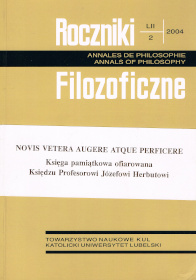Charles S. Peirce’s Critique of Cartesian Epistemology. At the Origins of Contemporary Philosophy
Abstract
The paper presents Ch. S. Peirce's attack on Cartesian epistemology as it was formulated in 1868 article Some Consequences of Four Incapacities. Peirce's arguments are analyzed in the context of possible Descartes' responses. One conclusion of the paper is that Peirce uses two different notions of knowledge and science, and that the distance of his ideas from that of Descartes depends, among others, on which notion we take into account. Another conclusion is that although Peirce's general project of combining falibilism and anti-scepticism looks very attractive (especially in the light of what we now know about the development of science) it generates many problems that Descartes could have pointed out if he had a chance to talk to his two and a half century younger debater. Despite, however, the problems Peircean project generates, it may be regarerd as a forerunner of typical tendencies of 20th century philosophy such as e.g. fallibilism or antifoundationalism.
Copyright (c) 2004 Roczniki Filozoficzne

This work is licensed under a Creative Commons Attribution-NonCommercial-NoDerivatives 4.0 International License.





